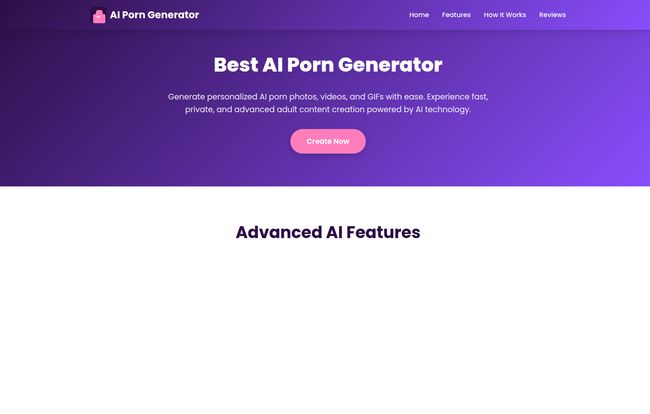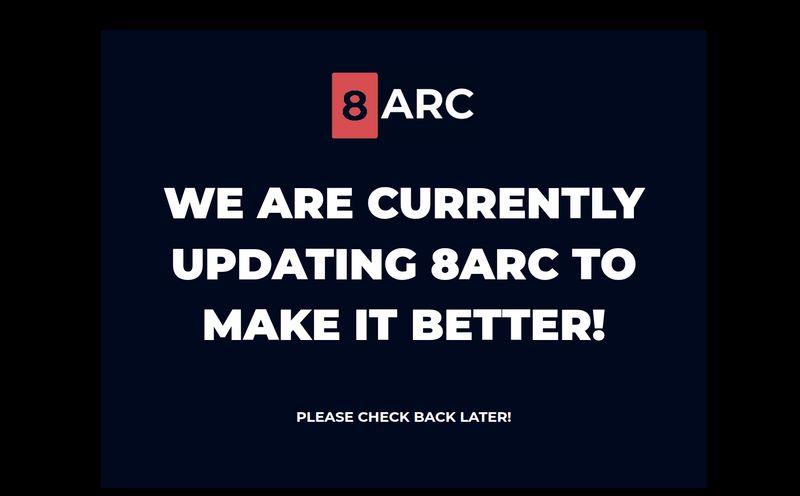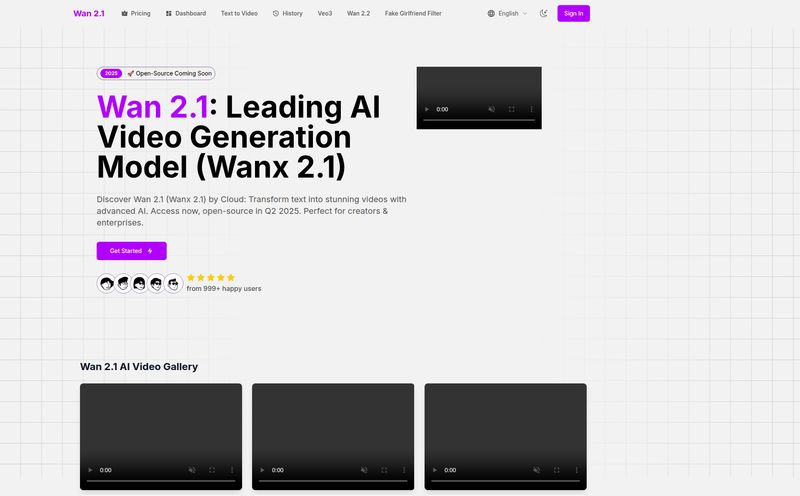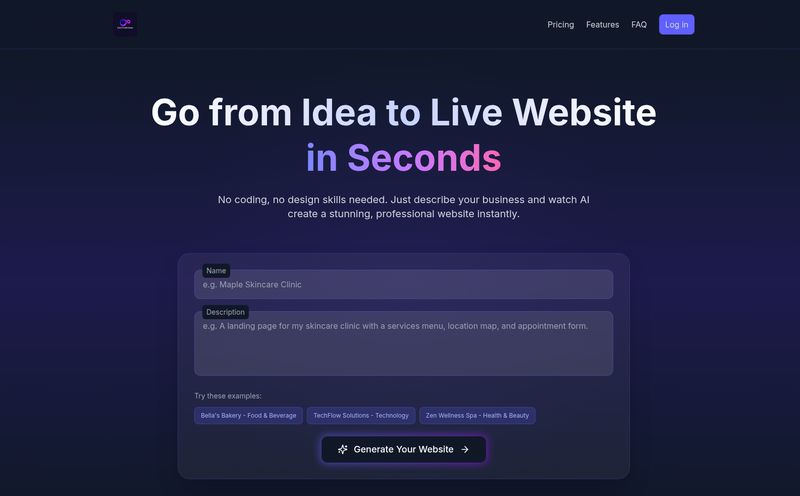As someone who’s been neck-deep in SEO, traffic trends, and the absolute chaos of digital content for years, I’ve seen it all. Or so I thought. Every time I think the internet has found its ceiling, someone builds a new ladder. The latest ladder? It’s built by AI, and it’s leading to some... interesting places.
We've all seen the explosion. AI writing articles, AI creating stunning art from a few words, AI coding assistants that make developers' lives easier. It’s a gold rush. But like any gold rush, for every person digging for revolutionary tech, there's someone else realizing you can also use those same tools to, well, cater to humanity's oldest interests. Which brings me to the topic of the day: AI porn generators, and one curious example called Monobar.pro.
So, What Was Monobar.pro Supposed to Be?
A little while back, the domain Monobar.pro popped onto my radar. The landing page was slick, I'll give it that. All cool purples and clean fonts, promising the “Best AI Porn Generator.” It talked a big game—personalized AI photos, videos, GIFs, all created with “advanced AI technology.” The call to action was simple and direct: “Create Now.”

Visit Monobar
It looked like a pretty standard SaaS (Software as a Service) offering, just for a market that most VCs won't touch with a ten-foot pole. The idea was clear: give users the power to generate custom adult content safely and privately. On paper, it’s the logical, if controversial, next step in AI image generation. It promised a catalog of features and user testimonials. It was positioned as a leader in a burgeoning, if taboo, market.
Funny thing is, there were also these weird whiffs of a corporate training platform mixed in. A strange detail, right? Maybe a leftover template, maybe a bizarre pivot attempt. Who knows. But the main thrust was undeniable.
The Elephant in the Room: The Ethics of AI-Generated Adult Content
Now, we can't talk about a platform like this without getting into the weeds. And the weeds are thorny. When I first started hearing about these tools, my SEO brain immediately saw the traffic potential—the search volumes are huge. But my human brain went, “oh, this is a minefield.”
Let's break it down. The obvious appeal is customization and privacy. No real people involved, no exploitation in the traditional sense. But it's not that simple, is it? The biggest fear, and it's a legitimate one, is the potential for creating non-consensual imagery. The same tech that can create an imaginary person can be tweaked to create a deepfake of a real one. And that’s a legal and ethical nightmare. The line between fantasy and digital violation becomes terrifyingly thin. It’s something organizations like the Electronic Frontier Foundation (EFF) have been warning about for a while.
"Once a tool is out there, you can't really control its use. You can set terms of service, but enforcing them on a global scale is a whole other ballgame."
Then there's the content itself. What happens when a user tries to generate illegal or deeply disturbing material? Who is liable? The user? The platform? It’s a Pandora's box of digital creation, and I’m not sure anyone has a good lid for it yet. These platforms operate in a gray area that technology has created far faster than legislation can keep up.
Why the Sudden Disappearance? The 404 Mystery
So, I went to check on Monobar.pro again while prepping this article, and what did I find? A stark, white page with two words: “404 Not Found.” The digital equivalent of a boarded-up shop with the lights off.
What happened? Honestly, it could be anything.
- Legal Pressure: The most likely culprit. A cease-and-desist letter from a legal team or a hosting provider getting cold feet is common in these high-risk niches.
- Technical Failure: Maybe the small team behind it just couldn't keep the servers running. This stuff is resource-intensive.
- A Rebrand or Pivot: They could be relaunching under a new name to dodge bad press or a poor reputation. A classic internet maneuver.
- It Was a Dud: It's possible the tech just didn't work as advertised and they pulled the plug before it got ugly.
In my experience, ventures in these fringe markets are like digital ghost towns waiting to happen. They pop up, generate a ton of buzz and traffic, and then vanish just as quickly. It’s a high-risk, high-reward game, and the house—in this case, legal and ethical reality—often wins.
The Broader Trend of AI in Niche Content Creation
Monobar’s story isn’t just about one website. It’s a snapshot of a much larger trend. The AI image generation space is the new Wild West. For every Midjourney creating beautiful landscapes, there's a dozen smaller, scrappier players carving out niches we're not talking about in polite company.
From an SEO perspective, the interest is undeniable. People are curious. The search queries are there. And where there's traffic, there's an attempt to monetize. These sites, however fleeting, can pull in staggering numbers of visitors. But it's a volatile strategy. You're building your castle on sand that could be washed away by a single Google algorithm update, a new piece of legislation or a payment processor deciding you're too risky.
This whole episode is a fantastic case study in the lifecycle of gray-area tech. It's born from innovation, fueled by human curiosity, and lives under the constant threat of being shut down. We saw it with file-sharing platforms, we're seeing it with crypto, and we're definitely seeing it here.
Are There Alternatives to Monobar? A Quick Look
With Monobar gone, are there other options? Of course. A quick search will show you that this market is already crowded. I won't list them here, but if you decide to explore this space, you need to go in with your eyes wide open. Look for platforms that have a clear, comprehensive Terms of Service. See what they say about data privacy—are they storing your creations? Your prompts? You should also check their content policies. A platform that takes a strong stance against the creation of non-consensual or illegal imagery is, at the very least, showing some awareness of teh risks involved.
But remember, even with policies in place, it's a largely unregulated field. Caution is your best friend here.
Frequently Asked Questions
- Is using an AI porn generator legal?
- It's complicated. The legality depends heavily on your location and how you use the tool. Creating content with fictional, adult characters is generally in a legal gray area. However, creating deepfakes of real people without their consent is illegal in many places and highly unethical everywhere.
- What are the main risks of these platforms?
- The primary risks include potential data privacy issues (what happens to the content you generate?), the ethical dilemma of the technology itself, and the risk of being exposed to or creating deeply problematic or illegal content, even unintentionally.
- Why are AI adult content generators becoming so popular?
- Several factors are at play: the appeal of complete customization, the element of anonymity, and pure curiosity about the capabilities of new AI technology. It offers a level of control and privacy that traditional adult media doesn't.
- What actually happened to Monobar.pro?
- The site is currently offline and displays a “404 Not Found” error. The exact reason isn't public, but speculation points towards legal pressure, technical issues, or the platform being shut down by its operators. It's a common fate for sites in this high-risk industry.
- How realistic is the content from these AI generators?
- The technology is improving at an incredible pace. While some outputs can still look strange or fall into the "uncanny valley" (especially with hands!), many AI image generators can now produce photorealistic results that are difficult to distinguish from actual photographs.
Final Thoughts on a Brave New World
The story of Monobar.pro is more than just a dead link. It's a sign of the times. We're standing at a crossroads where technology is giving us incredible powers of creation, but our rules and ethics are still playing catch-up. These AI tools aren't inherently good or bad; they're just powerful. And with great power... well, you know the rest.
As we move forward, the conversation around AI needs to include these uncomfortable, niche corners of the internet. Because what happens here often sets precedents for what's to come. For now, Monobar is a digital ghost, a cautionary tale about the volatility and complexity of the AI frontier. And I, for one, will be watching to see what crawls out of the code next.
References and Sources
- Electronic Frontier Foundation (EFF). (2019, October 29). Fighting Deepfakes. Retrieved from https://www.eff.org/deeplinks/2019/10/fighting-deepfakes
- Monobar.pro (archival analysis and screenshots)



